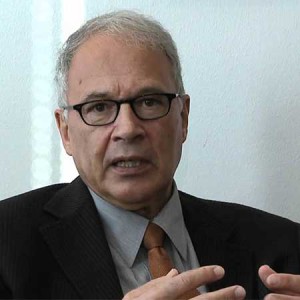Professor Hans-Georg Knopp – It’s not that Simple
 Professor Hans-Georg Knopp is a cultural scholar, former secretary-general of the Goethe Institute in Munich, and former director of Haus der Kulturen der Welt in Berlin. He lives in Shanghai.
Professor Hans-Georg Knopp is a cultural scholar, former secretary-general of the Goethe Institute in Munich, and former director of Haus der Kulturen der Welt in Berlin. He lives in Shanghai.
The Chinese copy stuff! Sure, everyone knows that, and the topic is often discussed with a certain malice and arrogance – as if the only thing people in China can do is copy things that were invented elsewhere.
And so the films that everyone knows and that are shown everywhere also focus on the products. We often get to see the goods that are exact replicas of the originals. In fact, Germany even has a kind of “award” for product piracy – though it’s actually designed to shame the people who make these products. “Theft” and “piracy” are the keywords here.
But who tells those of us in Europe about the people behind the products? About the reasons why they do what they do? And do they really just make exact replicas, or might there be more to it than that?
Jürg Neuenschwander’s film poses precisely these questions in a refreshing, slow-paced, and observant way. He does not approach the material as an accuser, but rather as someone looking to explore the terrain. Too often, films about this subject are just illustrated judgments that were formed long ago. This one, though, does not spoon-feed its viewers. They can – and should – form their own opinions.
After all, we actually know relatively little about the circumstances in which Chinese people live. What are their stories? Their motivations? Where do these inventors live? Do they have families? What do they think? How do they relate to the subject? Where do they stand on it?
And suddenly we see people, not copiers. The film shows us that this is not about making straightforward replicas – though that does happen, too, of course – but about people developing something in challenging circumstances that fits with the situation in China. And this is a unique form of creativity.
The Swiss company Bühler also recognizes this; it would never have entered the market otherwise. After all, anyone who wants to get into the market in this country must, as is the case all over the world, adapt to the local situation.
And here, too, there is much talk of such important and indispensable qualities as trust. Had there not been any feelings of goodwill between the Swiss company and the Chinese company, this merger would never have come about.
This is another thing that comes over in the film: a liking for people who want to achieve something. Not at any price – though of course that also exists. But here it is not about crowding European amplifiers out of the market, or about putting U.S. drone manufacturers out of business. Rather, it is about moving this country forward and creating better opportunities for the people who live here.
Jürg Neuenschwander looks behind the scenes. He does not call it quits at the surface, but digs deeper and creates awareness. He also makes it clear that the subject is not that simple, even measured against other areas – for instance, when it is pointed out that people all over the world build on the discoveries and inventions of others. Perhaps it is also too simple to say that this is a kind of research rather than copying. But it is a point worth thinking about.
The film thus touches on a number of important aspects that set Neuenschwander’s protagonists apart from the other, unscrupulous copiers who no doubt exist.
Our protagonists are “entrepreneurs” who are building up companies and want to develop products. Their inquisitiveness is indeed remarkable. Some went to Switzerland at their own expense, and we meet and experience others who have traveled to California. We watch as they succeed, but we also see how misunderstandings cause them to fail.
We certainly cannot deny that copying, imitating, is an important part of Chinese culture. The master leads the way, and the student follows. But even then, the true masters are those who can surpass their teachers, who can add their own ideas to the traditions that went before. And are we not exactly the same? We are all standing on the shoulders of giants!
This is how products are optimized and improved for specific circumstances. And, frankly, are we not often happy about that? A development that stands still is no good for anyone – and how often do we say that someone should follow someone else’s example? The Swiss firm Bühler is leading the way by showing us how it is possible not just to come to terms with the situation, but to actually co-exist with it on the best of terms.
Smart and bold, yes: these are the qualities necessary to create the types of company we see in the film. And these people are definitely – and in the best, most likeable way – smart and bold.
